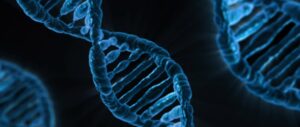CHI becomes nation’s first public lab to earn accreditation to perform Forensic Genetic Genealogy
- October 12, 2023
- By: Sam Jordan
- On Campus

The Center for Human Identification at The University of North Texas Health Science Center at Fort Worth announced today that it is the first public crime lab in the U.S. to offer Forensic Genetic Genealogy, or FGG, capabilities, making it possible to solve decades-old crimes once thought to be unsolvable.
Using a combination of advanced DNA technology and genealogical mapping, the center will assist law enforcement and medicolegal agencies in solving both criminal and missing persons cases. The announcement follows the center’s recent accreditation extension by the ANSI National Accreditation Board.
This extension in the field of forensic testing includes the addition of Single-Nucleotide Polymorphism, better known as SNPs, and Massively Parallel Sequencing, or MPS technology, which support the FGG process.
“FGG is changing the landscape of the criminal justice system at a global level,” said Dr. Michael Coble, executive director of HSC’s Center for Human Identification. “As the first accredited public lab to offer this technology, we hope to become the go-to cold case center for Texas and eventually the nation. Most importantly, it will allow us to assist in unresolved cases, bringing solutions to families that have had to wait far too long for answers about their loved ones.”
Through its new FGG and investigative support units, the center will be able to provide free FGG services to Texas law enforcement agencies. Until now, the cost, time and level of scientific validation necessary for official accreditation to keep pace with the technology have forced law enforcement agencies to use private, for-profit and sometimes unaccredited companies. This has meant that small departments, historically underserved indigenous agencies and victims’ families have had limited access to the technology.
Following an internal scientific and capital investment of more than $4 million, CHI will implement FGG technology in a three-tiered approach: Kintelligence (target sequencing), MicroArray and Whole Genome Sequencing. Kintelligence targets just over 10,000 SNPs using massive parallel sequencing techniques. MicroArray analyses target 650,000 to 2.5 million SNPs using fluorescent tags. Whole Genome Sequencing uses MPS to attempt to sequence the whole genome multiple times, collecting up to 3 billion data points. While a few private labs have started using some of these platforms, no other publicly accredited laboratory currently offers this full spectrum.
As the single-largest contributor of DNA profiles to the CODIS missing and unidentified persons database, the Center for Human Identification is world-renowned for its scientists’ specialization with deteriorated evidence, kinship testing, mitochondrial DNA testing and Y-chromosomal DNA testing. This expertise enables the center’s analysts to provide genetic information necessary for analysis in unresolved criminal and missing person cases in which the age and deterioration of the evidence can be a barrier.




Social media